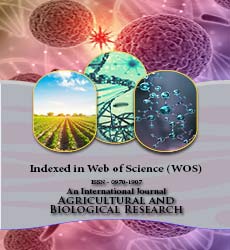Agricultural and Biological Research
RNI # 24/103/2012-R1
Climate change is caused by the burning of fossil fuels, raising animals, and other human activities, resulting in the greenhouse effect and global warming. This research aims to determine the mediating effects of the perceived impacts on students’ knowledge and attitudes of climate change to communicate and send message about possible environmental policies to address climate change. The study was conducted among 415 higher education students in selected colleges and universities in Misamis Occidental during the first quarter of the calendar year 2023. The quantitative-correlational research design was used. Standardized questionnaires were adopted and slightly modified to provide the needed information relative to the problems. Data analysis was done with frequency and percentage distribution, weighted average mean, and multiple mediation analysis through SPSS. The study revealed that most participants have a satisfactory level of knowledge on climate change, understanding that extreme events like hurricanes, drought, and forest fires impact energy infrastructure, and that forest serve as a sink in the carbon cycle. They also have high positive attitudes towards climate change, believing that individuals can make a positive difference in global climate change. The multiple mediation analysis revealed the strength of mediation of the perceived impacts of climate change on the relationship between the participants’ knowledge and their attitudes on climate change. It is recommended that participants further their understanding of climate change by taking part in academic project work activities, such as researching environmental issues that have an impact on people's lives and society, such as reforestation, cutting back on firewood use, considerate use of nonrenewable energy sources, and solid waste management.
